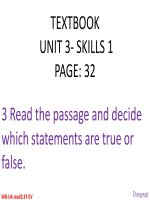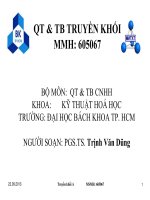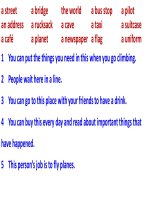Unit 3 3 community service lesson 3 a closer look 2 kho tài liệu học tiếng anh
Bạn đang xem bản rút gọn của tài liệu. Xem và tải ngay bản đầy đủ của tài liệu tại đây (7.56 MB, 24 trang )
UNIT 3: COMMUNITY SERVICE
A CLOSER LOOK 2
•
•
•
•
•
•
•
•
1. disabled people: người tàn tật
2. elderly people: người già
3. homeless people: người vô gia cư
4. Sick children: trẻ em bị bệnh
5. people in a flooded area: nạn nhân vùng lũ
6. volunteer work: việc tình nguyện
7. Provide: cung cấp
8. donate: hiến tặng
1.a. Underline the past simple tense or the present
perfect.
Reporter: Have you ever done volunteer work?
Mai: Yes. I am a member of Be a Buddy- a programme
that helps street children. Last year we provided
evening classes for fifty children.
Reporter: Wonderful! What else have you done?
Mai: We’ve asked people to donate books and clothes to
the children.
1.a.Underline the past simple tense or the present
perfect.
Reporter: Have you ever done volunteer work?
Mai: Yes. I am a member of Be a Buddy- a programme
that helps street children. Last year we provided
evening classes for fifty children.
Reporter: Wonderful! What else have you done?
Mai: We’ve asked people to donate books and clothes to
the children.
1. Underline the past simple or present perfect. (Ex. 1/p.29)
Reporter: Exactly. Have you ever done volunteer work?
Mai:
Yes. I am a member of Be a Buddy – a programme that helps
street children. Last year we provided evening classes for fifty
children.
Reporter : Wonderful! What else have you done?
Mai:
We’ve asked people to donate books and clothes to the children
Present perfect tense:
The Past simple
Use: We use the simple past for an
action that started and finished in
the past.
Positive
S+ V-ed, V2
Negative
S + didn’t + V
Question::
Did + S + V ?
- We use the present perfect for an
action that happened some time before
now. The exact time is not important
Positive
Ss + Have / Has + V( Ved, V3)
Negative: Ss + Haven’t / Hasn’t + been
Questions: Have/ has + S + P ?
b. When do you use the past simple ?
When do we use the present perfect?
Can you think of the rule?
Past simple: We use the past simple for an action that
started and finished in the past. We often use specific
time expressions ( yesterday, last month, two years
ago) with the past simple.
Quá khứ đơn giản: Chúng ta sử dụng quá khứ đơn giản
cho một hành động bắt đầu và kết thúc trong quá khứ.
Chúng ta thường sử dụng các cách diễn tả thời gian cụ
thể (ngày hôm qua, tháng trước, cách đây 2 năm) với
quá khứ đơn giản.
Ex: Last year we provided evening classes for fifty children.
b. When do you use the past simple ?
When do we use the present perfect?
Can you think of the rule?
Present perfect: We use the present perfect for an action
that happened some time before now. The exact time is
not important. We often use ever, never, so far, several
times... with the present perfect.
Hiện tại hồn thành: Chúng tơi sử dụng hiện tại hoàn
hảo cho một hành động đã xảy ra một thời gian trước
khi bây giờ. Thời gian chính xác khơng quan trọng.
Chúng tôi thường sử dụng bao giờ, không bao giờ,
nhiều lần ... với hiện tại hoàn thành.
Ex: We’ve asked people to donate books and clothes to
the children .
1. Put the verbs into the correct form. (Ex. 2/ p. 30)
1. They ( clean) ............... the beaches one week ago.
2. They ( collect) ............................... hundreds of
books so far.
3. I (collect) ....................... stamps when I was a child
4. She ( fly) ...................... to Danang many times but
last year she (go) ................... there by train.
5. You ever ( see)................................. a real lion?
No, but I (see) .................. a real elephant when we
went to the zoo last month
1. Put the verbs into the correct form. (Ex. 2/ p. 30)
1. They ( clean)cleaned
............... the beaches one week ago.
2. They ( collect) ............................... hundreds of
books so far.
3. I (collect) ....................... stamps when I was a child
4. She ( fly) ...................... to Danang many times but
last year she (go) ................... there by train.
5. You ever ( see)................................. a real lion?
No, but I (see) .................. a real elephant when we
went to the zoo last month
1. Put the verbs into the correct form. (Ex. 2/ p. 30)
1. They ( clean)cleaned
............... the beaches one week ago.
have collected
2. They ( collect) ...............................
hundreds of
books so far.
3. I (collect) ....................... stamps when I was a child
4. She ( fly) ...................... to Danang many times but
last year she (go) ................... there by train.
5. You ever ( see)................................. a real lion?
No, but I (see) .................. a real elephant when we
went to the zoo last month
1. Put the verbs into the correct form. (Ex. 2/ p. 30)
1. They ( clean) cleaned
............... the beaches one week ago.
have collected hundreds of
2. They ( collect) ...............................
books so far.
collected stamps when I was a child
3. I (collect) .......................
4. She ( fly) ...................... to Danang many times but
last year she (go) ................... there by train.
5. You ever ( see)................................. a real lion?
No, but I (see) .................. a real elephant when we
went to the zoo last month
1. Put the verbs into the correct form. (Ex. 2/ p. 30)
1. They ( clean) cleaned
............... the beaches one week ago.
have collected hundreds of
2. They ( collect) ...............................
books so far.
collected stamps when I was a child
3. I (collect) .......................
has flown to Danang many times but
4. She ( fly) ......................
last year she (go) ................... there by train.
5. You ever ( see)................................. a real lion?
No, but I (see) .................. a real elephant when we
went to the zoo last month
1. Put the verbs into the correct form. (Ex. 2/ p. 30)
1. They ( clean) cleaned
............... the beaches one week ago.
have collected hundreds of
2. They ( collect) ...............................
books so far.
collected stamps when I was a child
3. I (collect) .......................
has flown to Danang many times but
4. She ( fly) ......................
last year she (go) went
................... there by train.
5. You ever ( see)................................. a real lion?
No, but I (see) .................. a real elephant when we
went to the zoo last month
1. Put the verbs into the correct form. (Ex. 2/ p. 30)
1. They ( clean) cleaned
............... the beaches one week ago.
have collected hundreds of
2. They ( collect) ...............................
books so far.
collected stamps when I was a child
3. I (collect) .......................
has flown to Danang many times but
4. She ( fly) ......................
went
last year she (go) ...................
there by train.
Have you ever seen. a real lion?
5. You ever ( see)................................
No, but I (see) .................. a real elephant when we
went to the zoo last month
1. Put the verbs into the correct form. (Ex. 2/ p. 30)
1. They ( clean) cleaned
............... the beaches one week ago.
have collected hundreds of
2. They ( collect) ...............................
books so far.
collected stamps when I was a child
3. I (collect) .......................
has flown to Danang many times but
4. She ( fly) ......................
last year she (go) ...................
there by train.
went
Have you ever seen. a real lion?
5. You ever ( see)................................
saw a real elephant when we
No, but I (see) ..................
went to the zoo last month
3.Choose the best answer .
a. ...........your homework yet? ( are you doing, have you
done, do you do)
b. Yes,I ...it already. ( am doing, have done, do)
c. Dickens... a lot of novels.( has written, writes, wrote).
d. Her mother ...three books. She is going to start the
fourth one soon. (has written, writes, wrote).
e. I think I ...him before. ( meet,met, have met)
f. Oh, yes! Now I remember. I ...him when I was in Hoi
An. He was our guide! ( meet, met, have met)
3.Choose the best answer .
a............your homework yet? ( are you doing , have you
done, do you do)
b. Yes, I ...it already.( am doing, have done,do)
c. Dickens... a lot of novels.( has written, writes, wrote).
d. Her mother ...three books She is going to start the
fourth one soon.(has written, writes, wrote).
e. I think I ...him before.( meet, met, have met)
f. Oh, yes ! Now I remember .I ...him when I was in Hoi
An. He was our guide!( meet, met, have met)
4.With a partner, write sentences about yourself in the
past simple and the present perfect. Use the words from
the box below.
last December , never, five years ago, already, when I was a
child , so far, yet....
Ex: She met Peter five years ago.
He has not finished his homework yet.
• - I did the volunteer work in Dong Nai five years ago.
• - When I was a child, I cried a lot.
• - I have visited Hanoi three times.
• - I started to dance in 2011.
• - I had lunch one hour ago.
• - Yesterday I went to the zoo with family.
• - I haven’t been to Da Nang yet.
5. In pairs, student A looks at the fact sheet below
and student B looks at the fact sheet on page 33.
Each student asks and answer questions about the
fact sheet to complete the information.
(Theo cặp, học sinh A nhìn vào tờ giấy sự việc bên
dưới và học sinh B nhìn vào tờ giấy sự việc
trang 33. Mỗi học sinh hỏi và trả lời những câu
hỏi về tờ giấy sự việc để hồn thành thơng tin)
page 33
5. In pairs, student A looks at the fact sheet below
and student B looks at the fact sheet on page 33.
Each student asks and answer questions about the
fact sheet to complete the information.
Ex: - BE A BUDDY (LÀM BẠN ĐỒNG HÀNH)
A: What happened in 2011?
B: Be a Buddy was established in 2011.
What did Be a Buddy do in 2012?
A: In 2012, Be a Buddy started ‘A Helping Hand’
programme for street children.
B: What has Be a Buddy done so far?
A: It collected books and clothes for street children.
It also made toys for children in need.
5. In pairs, student A looks at the fact sheet below
and student B looks at the fact sheet on page 33.
Each student asks and answer questions about the
fact sheet to complete the information.
- GO GREEN (XANH)
• A: What happened in 2011?
• B: Go Green was established in 2011. What did
Go Green do in 2012?
• A: In 2012 Go Green started clean up project on
every first Sunday.
• B: What has Go Green done so far?
• A: It helped people recycled rubbish and
cleaned up streets and lakes. It also planted
flowers and trees.









